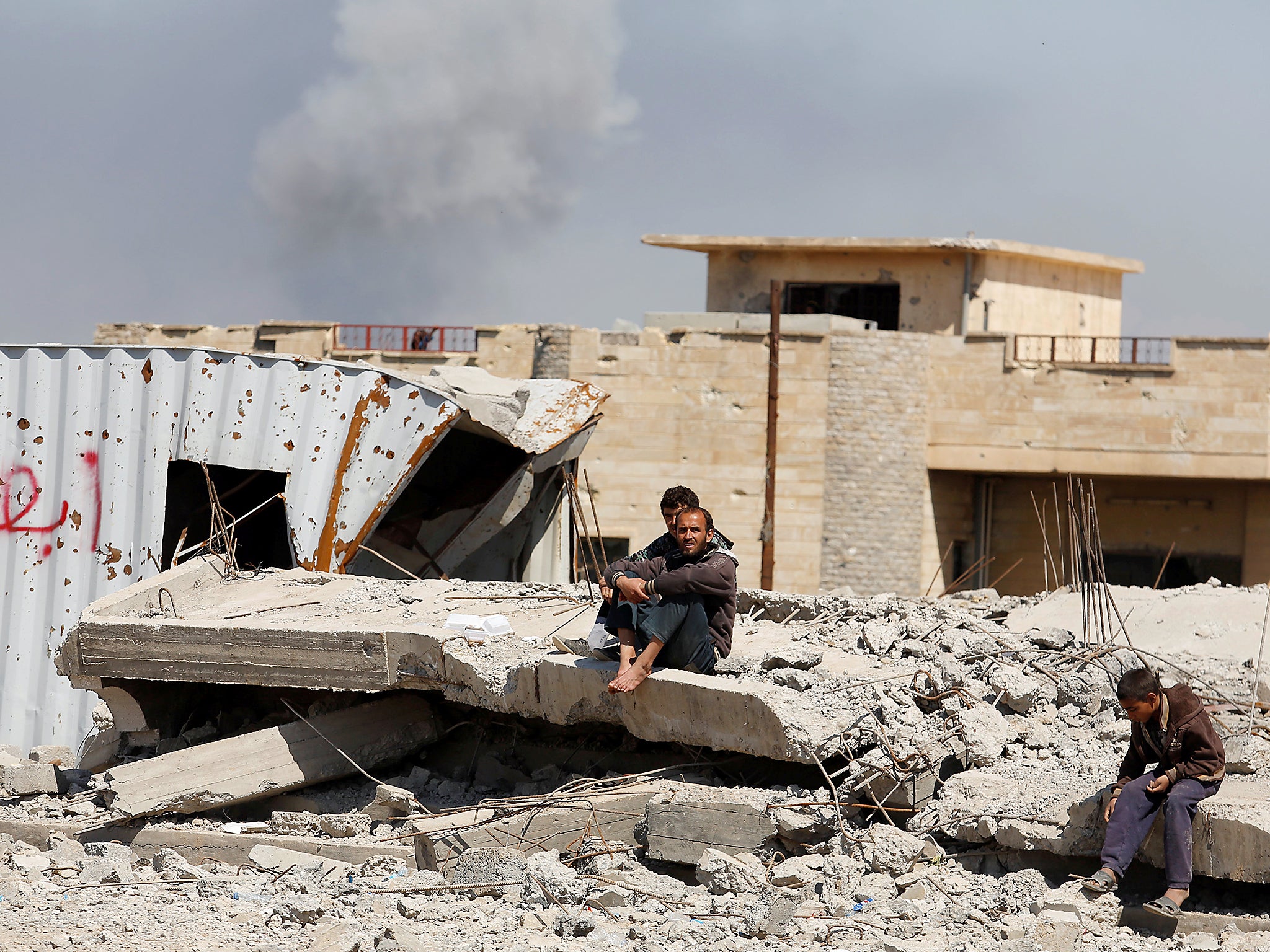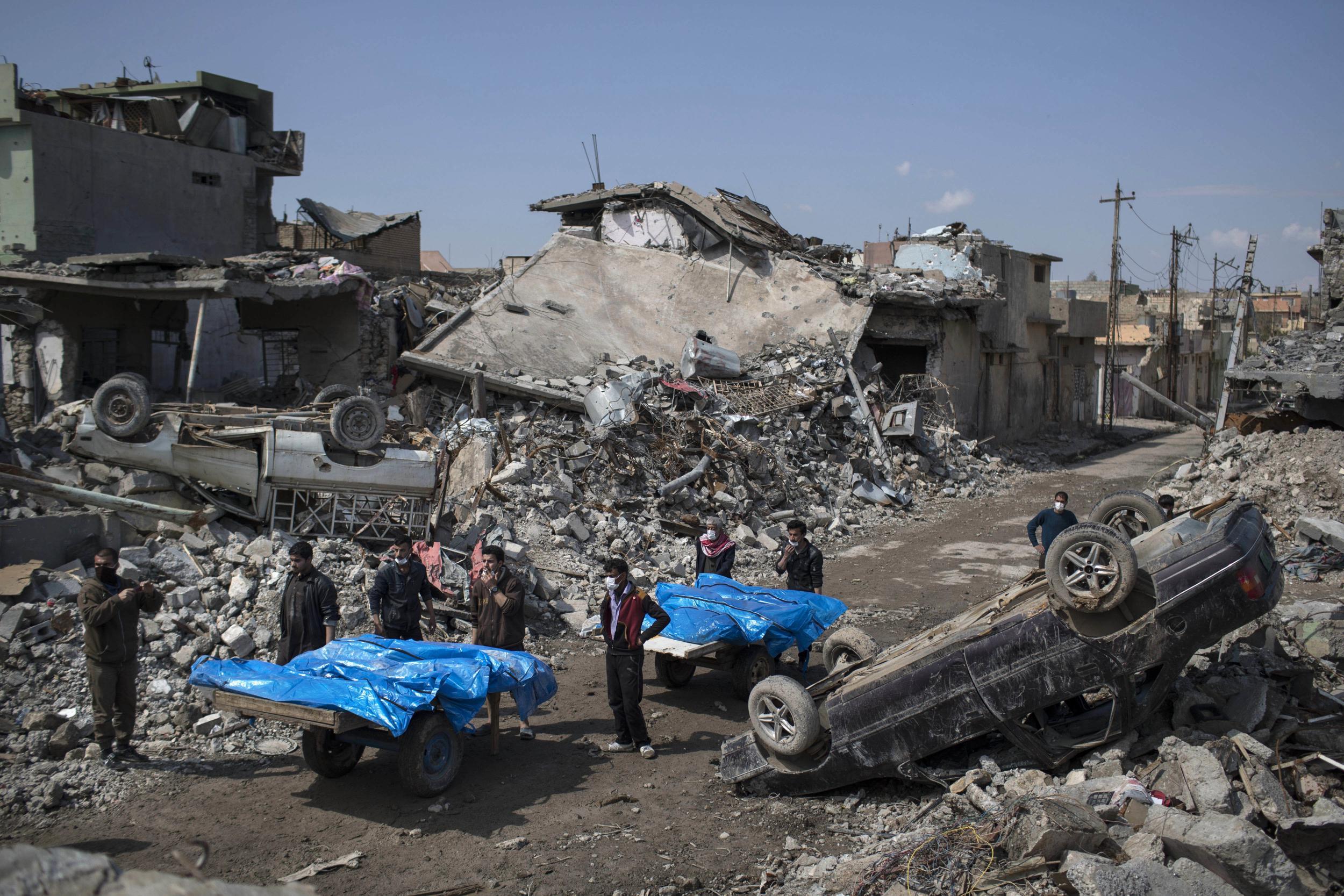Mosul: More than 300 civilians killed in just one month amid intensified US air strikes and Isis atrocities, says UN
Deadliest single incident is US-led air strike that allegedly hit homes in al-Jadida district

Your support helps us to tell the story
From reproductive rights to climate change to Big Tech, The Independent is on the ground when the story is developing. Whether it's investigating the financials of Elon Musk's pro-Trump PAC or producing our latest documentary, 'The A Word', which shines a light on the American women fighting for reproductive rights, we know how important it is to parse out the facts from the messaging.
At such a critical moment in US history, we need reporters on the ground. Your donation allows us to keep sending journalists to speak to both sides of the story.
The Independent is trusted by Americans across the entire political spectrum. And unlike many other quality news outlets, we choose not to lock Americans out of our reporting and analysis with paywalls. We believe quality journalism should be available to everyone, paid for by those who can afford it.
Your support makes all the difference.More than 300 civilians have been killed by US-led air strikes, Isis bombs and snipers, shelling and fighting in the advance on western Mosul, the UN has said.
The deadliest single incident reported so far was in the al-Jadida district, where up to 240 civilians were killed in suspected bombing by the US-led coalition targeting Isis fighters.
The Pentagon admitted it carried out strikes that “correspond to allegations of civilian casualties”, insisting they struck Isis fighters and equipment, and has launched an investigation.
Zeid Ra’ad al-Hussein, the UN High Commissioner for Human Rights, condemned the “massive loss of civilian lives” caused by both Isis and the forces fighting to drive militants out of Mosul.
“The conduct of air strikes on Isis locations in such an environment, particularly given the clear indications that Isis is using large numbers of civilians as human shields at such locations, may potentially have a lethal and disproportionate impact on civilians,” he said.
Mr al-Hussein also condemned Isis’ “cowardly and disgraceful” use of human shields, which amounts to a war crime under international law.
“And shooting civilians in the back as they flee for their lives is an act of monstrous depravity,” he added.
Those attempting to cross the Tigris River told The Independent people were being shot dead on bridges by both Isis and Iraqi army snipers suspicious of Isis “infiltrators”.
According to information verified by the UN Human Rights Office and the UN Assistance Mission in Iraq, at least 307 civilians were killed and another 273 wounded between 17 February and 22 March.
At least 61 people have been confirmed dead in the al-Jadida strike on 17 March, although survivors said up to 240 people died after Isis snipers used their roof and bodies are still being pulled from the rubble.
Other witnesses told the UN that Isis had booby trapped houses with explosives, causing them to collapse – an allegation repeated by the Iraqi defence ministry.
Mr al-Hussein said he did not underestimate the “enormity of the challenges” facing Iraqi government forces and the international coalition but called on all sides to protect civilians.
“This is an enemy that ruthlessly exploits civilians to serve its own ends, and clearly has not even the faintest qualm about deliberately placing them in danger,” he added.
“It is vital that the Iraqi security forces and their coalition partners avoid this trap, review how their procedures comply with their obligations under the international humanitarian law principle of precautions, and consider all tactical options available with a view to avoiding civilian loss of life.”
He urged investigations underway by Iraqi authorities and the US-led coalition to be thorough and transparent, as well as calling for an "urgent review" of tactics as soldiers push into densely populated parts of western Mosul.
The Pentagon insisted its rules of engagement had not been loosened amid speculation over a potential link between rocketing civilian casualty reports and Donald Trump’s presidency.
US-led air strikes called in by Iraqi forces on the ground were blamed for many civilian deaths, which have also been caused by Isis IEDs, shelling and gunfire from both sides.
The UN listed another “serious incident” on 22 March, where an air strike hit a residential building in Rajm Hadid killed a seven-year-old girl and injured several other children.
“Isis reportedly filled the house with people from the surrounding neighbourhood, including children, and then used the house to launch rocket-propelled grenades against the Iraqi Security Forces,” the report said.
At least 95 civilians were allegedly killed between Thursday and Sunday in the districts of Risalah, Nabils, Uruba and Sainaah al-Qadimah as a result of shelling, vehicle-based and other explosive devices planted by Isis and by the group’s snipers.

The UN has received reports of the terrorist group forcibly moving civilians around western Mosul to use as human shields, ordering them inside buildings and then using them as sniper and mortar positions.
“There have been numerous reports that Isis snipers have shot at, and in some cases killed or wounded, civilians attempting to flee towards the Iraqi Security Forces, and that Isis has also shelled civilians in areas of the city retaken by Government forces,” a spokesperson said.
The US’ official civilian death toll from the air campaign against Isis in Syria and Iraq stands at 220, although monitors say the real total is far higher and Airwars warned of “record” deaths passing the 1,000 mark.
Casualties caused in the incident and many others in western Mosul forced a temporary pause in the advance by Iraqi government forces over the weekend.
Iraq’s federal police announced a new push into south-western parts of the Old City on Monday, heading towards the al-Nuri mosque where Isis leader Abu Bakr al-Baghdadi declared the formation of his “caliphate” in 2014.
Isis has been fortifying Mosul for almost four years and its militants are deploying suicide car bombs, mines, booby traps, ambushes, mortars and drones to defend their last city stronghold in Iraq.
Faced with their toughest battle yet, Iraqi and coalition forces have increasingly turned to air strikes and artillery to clear and hold territory in densely-populated western districts.
Join our commenting forum
Join thought-provoking conversations, follow other Independent readers and see their replies
Comments